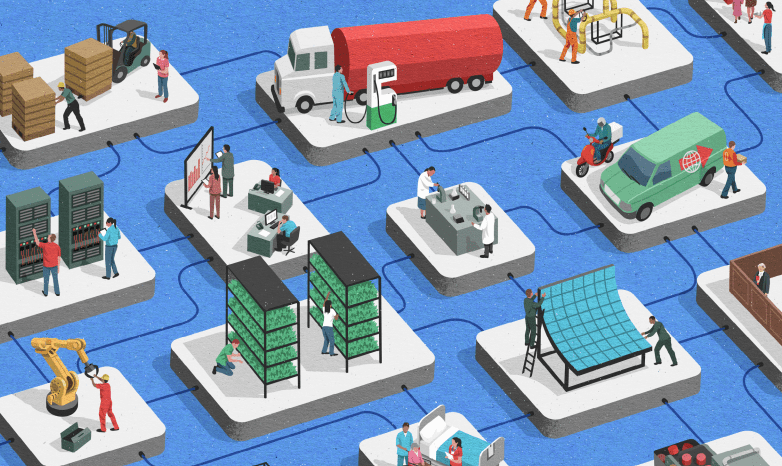2023 Jobs Report indicates 25% job disruption – employee engagement time
Earlier this month at the World Economic Forum (WEF) Growth Summit, an Insight Report on the Future of Jobs was released.
Resulting from a survey of hundreds of CEOs, HR, and business leaders, the report was combined with hard data and WEF partner input, capturing findings on 673 million workers in the global workforce.
The report draws attention to the crucial role of Voice of the Employee (VoE) initiatives in addressing the disruptive impact on the workforce of economic uncertainty, AI, and green transition trends. Critically it underscores the significance of actively listening to employee concerns and taking action to attract, retain, reskill, and upskill existing employees.
Here are some of the key trends highlighted in the report:

Saadia Zahidi, Managing Director of the World Economic Forum suggests that the combination of economic uncertainty, AI and green transition trends will disrupt nearly a quarter of the workforce, with 23% of jobs disrupted, about half of which will be declining. The declining roles include jobs like bank tellers, administrative assistants, and secretaries – typically at the lower skills-level – all disrupted by AI, and digital. The other half of disrupted roles will conversely be an increase in white-collar jobs in areas such as AI, big data, sustainability, environmental, and other business specialisms. Growth sectors are expected to be in agriculture, education, and ‘green’ jobs.
Suzanne Duke, Head of Global Public Policy and Economic Graph Team at LinkedIn highlighted the twin transitions of ‘digital’ and ‘green’ as the biggest drivers of change and job growth on LinkedIn. 40% of the fastest-growing roles have fallen into these two categories. Cybersecurity, business analytics, and AI are all up, and in the past 12 months jobs mentioning GPT are up 50%. And hiring for green jobs has outpaced hiring for traditional jobs for the past four years, with three of the fastest growing roles being dedicated ‘green’ jobs. Interestingly, only 13% of workers have green skills to meet the climate challenge, suggesting more relevant skills training is required for employees.


Svenja Gudell, Chief Economist at Indeed discussed the booming demand in social jobs – health, care workers, and educators – during and after the pandemic, and this demand has not subsided. The time taken to fill these jobs is two to three times longer than non-social jobs. This must be an area for continued focus and increased pay to fill these jobs more readily.
Shravan Goli, COO at Coursera discussed reskilling for future work and emphasised that the skills gap is the greatest barrier to business transformation. People without degrees have been most impacted by labour market disruption, yet, from their own research, noted that learners without degrees could skill up at the same time as people with college degrees. This finding unlocks a massive opportunity for skills-based training and hiring to be applied to large segments of the population at the same time. This enables a focus on starting a new role with a micro-credential and building skills via a stackable skills pathway. This ‘skills-first’ hiring, based on micro-credentials can address the gap between the supply of available talent and the vacancies to be filled. Continued investment and upskilling can enable individuals who would not have been considered for a role five years ago to advance their career and progress into larger roles and more responsibility aligned with the organisation’s objectives.

On a similar theme, Diversity Equality and Inclusion (DEI) initiatives can tap into a much larger pool of available talent in countries with tight labour markets using a skills-first approach to hiring and training, rather than the traditional criteria of prior experience or degrees. This could yield a labour pool of 100 million people whose skills could be much better deployed in the workforce. Equally this DEI opportunity applies to developing countries where innovation, creativity, and ideas can come from all parts of the workforce.
Where do we see the Voice of the Employee (VoE) affecting what employers must do to address some of these trends?
A clear trend is emerging where employees want to be part of the decision to upskill, retrain, and leverage career pathways to open up new opportunities in a changing world of work.
One example is in younger workers’ attitudes since the pandemic. A recent LinkedIn Europe survey saw younger workers wanting to work for companies with green credentials. The appetite to reskill and upskill is there in younger workers and this places the onus on employers to create reskilling programs and a socially conscious environment where younger workers can succeed with micro-credentials.
A recent Deloitte report indicated that attracting and retaining talent in organisations is dramatically increased in those organisations with clear engagement and talent programmes, and this applies across the entire organisation, including high-performing talent.
In the new economy, cheap labour is seen less favourably by employees and consumers. Specifically in developing countries – countries like India, Bangladesh, Thailand, or Vietnam – who might benefit from strategies like ‘China Plus One’ and who will all be affected by the localisation of supply chains and production. It is therefore not just organisations, but entire countries and their government that must think differently about building education systems and skills in the adult workforce. Public-private partnerships need to be fostered in developing economies for young people in the education system to acquire the tech-literacy, leadership social influence, and analytical and creative thinking skills, required for the new work opportunities available.
While individuals are prioritising foundational, networking, digital, and analytical skills, the good news is that employers are looking ahead for employees with the human and social skills of resilience, agility, analytical and creative thinking, and leadership – things that AI cannot do. Striking a balance requires a top-to-bottom review of employability.
Summary
The successful organisations of the future will put people at the centre.
They will create a nurturing, supportive, and inclusive environment where employees’ voices are heard, ensuring a skilled and adaptable workforce that can thrive amidst disruptions.
Organisations that embrace VoE initiatives have the potential to strengthen their talent pool, drive employee engagement, and navigate the ever-changing landscape of work successfully.
Listen better. Act faster. Drive engagement & effectiveness.
To find out more about the benefits of Peachy Mondays for your organisation please get in touch today.
If you’ve found this article helpful, please sign up to our newsletter to stay informed of the latest insights from Peachy Mondays.
Related Posts
Categories
- Case Study (13)
- Change and transformation (21)
- Connectedness (4)
- Culture (17)
- Design (10)
- Diversity and Inclusion (1)
- Effectiveness (16)
- Employee engagement (60)
- Employee experience (43)
- Employee Feedback (51)
- Employee Wellbeing (1)
- Events (10)
- Financial Wellbeing (1)
- Happiness (4)
- Internal Communications (10)
- News (24)
- Onboarding (1)
- Organisational Effectiveness (18)
- Uncategorized (3)




